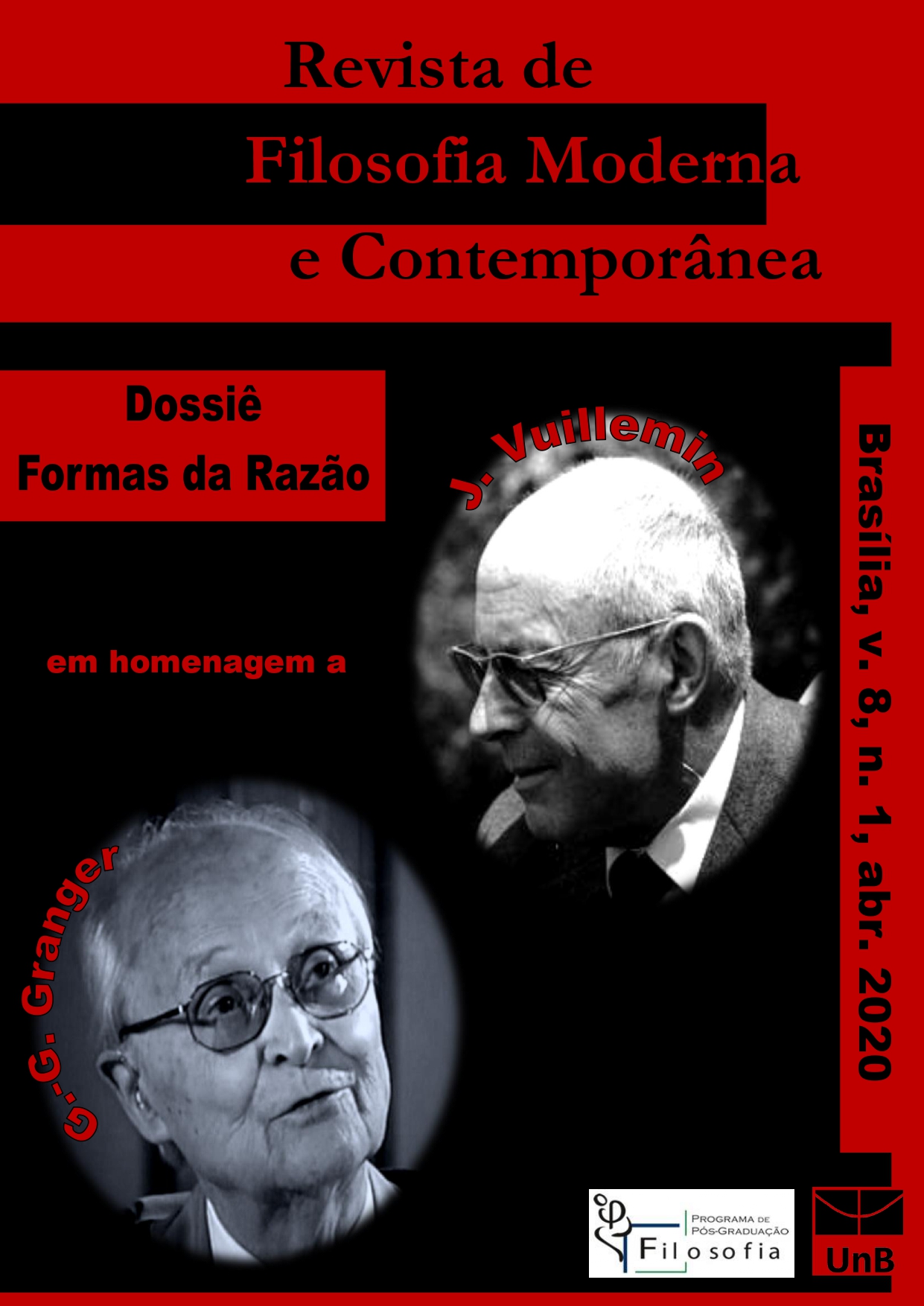Utilidade e Racionalidade na Economia Neoclássica
Uma Interpretação Grangeana da Teoria da Utilidade Esperada e da Hipótese das Expectativas Racionais
DOI:
https://doi.org/10.26512/rfmc.v8i1.29365Palabras clave:
utilidade, racionalidade, ciência econômica, ordinalismo, utilidade esperada, expectativas racionaisResumen
A teoria da utilidade é o fundamento do marginalismo que serve de base à teoria neoclássica. Desde suas origens, na década de 1870, ela passou por diversas transformações: um início hedonista (Jevons), adquiriu contornos ordinalistas (Pareto) que foram radicalizados em meados do século XX, viu a retomada da cardinalidade (von Neumann e Morgenstern), a formulação da teoria da utilidade esperada (Savage) e da hipótese das expectativas racionais. Nesse desenvolvimento histórico, a utilidade e a noção de racionalidade a ela associada foram esvaziadas de qualquer conteúdo psicológico, tornaram-se indissociáveis de cálculos probabilísticos e voltaram-se para o futuro, mas se mantiveram sempre como a pedra fundamental da teoria neoclássica. Essa última, como não poderia deixar de ser, alterou-se profundamente em consonância a essas transformações em seu conceito de base. A interpretação proposta está baseada no arcabouço conceitual de Gilles-Gaston Granger.
Descargas
Citas
CARLIN, W. & SOSKICE, D. Macroeconomics. Institutions, Instability, and the Financial System. Oxford: O.U.P., 2015.
DEBREU, G. The Theory of Value. An Axiomatic Analysis of Economic Equilibrium. New Haven: Yale U.P., 1959.
_______. Mathematical Economics: Twenty Papers of Gerard Debreu. Cambridge: C.U.P., 1983.
DE VROEY, M. A History of Macroeconomics from Keynes to Lucas and Beyond. Cambridge: C.U.P., 2016.
ENDERS, W. Applied Econometric Time Series. Danvers, MA: John Wiley & Sons, 2004.
ERICKSON, P.; KLEIN, J.; DASTON, L.; LEMOV, R.; STURM, T. & GORDIN, M. How Reason Almost Lost Its Mind. Chicago: University of Chicago Press, 2013.
FINE, B. & MILONAKIS, D. From Economics Imperialism to Freaknomics. The Shifting Boundaries between Economics and Other Social Sciences. London: Routledge, 2009.
GIOCOLI, N. Modeling Rational Agents. Northampton, MA: Edward Elgar, 2003.
GRANGER, G.-G. Méthodologie économique. Paris: P.U.F., 1955.
_______. Filosofia do estilo. São Paulo: Perspectiva e Editora da Universidade de São Paulo, 1974.
_______. Pensamento formal e ciências do homem (2 vols.). Lisboa: Editorial Presença e Porto Alegre: Martins Fontes, 1975.
_______. Filosofia, Linguagem, Ciência. Aparecida, SP: Ideias e Letras, 2013.
HARSANYI, J. Rational Behavior and Bargaining Equilibrium in Games and Social Situations. Cambridge: C.U.P., 1977.
HAUSMAN, D. Preference, Value, Choice, and Welfare. New York: Cambridge University Press, 2012.
HERSTEIN, I.N. & MILNOR, J. “An Axiomatic Approach to Measurable Utility”. In: Econometrica, 21, pp.291-297, 1953.
HEUKELOM, F. Behavioral Economics: A History. New York: Cambridge University Press, 2014.
JEVONS, S. A teoria da economia política. São Paulo: Abril Cultural, 1983.
KNIGHT, F. Risk, Uncertainty and Profit. Boston: Houghton Mifflin, 1921.
LJUNGQVIST, L. & SARGENT, T. Recursive Macroeconomic Theory (2nd Edition). Cambridge, MA: The MIT Press, 2000.
LUCAS, R. & SARGENT, T. “After Keynesian Macroeconomics”. In: LUCAS, R. & SARGENT, T. (eds.). Rational Expectations and Econometric Practice (2.vols.). Minneapolis: University of Minnesota Press, 1981.
MANDLER, M. Dilemmas in Economic Theory. Persisting Foundational Problems of Microeconomics. Oxford: Oxford University Press, 2001.
MARSCHAK, J. “Rational Behavior, Uncertain Prospects, and Measurable Utility”. In: Econometrica, 18, pp.111-141, 1950.
MAS-COLELL, A; WHINSTON, M. & GREEN, J.R. Microeconomic Theory. Oxford: O.U.P., 1995
MCCANN, C. Probability Foundations of Economic Theory. London: Routledge, 1994.
MIROWSKI, P. Machine Dreams. New York: Cambridge University Press, 2002.
MIROWSKI, P. & NIK-KHAH, E. The Knowledge We Have Lost In Information. The History Of Information In Modern Economics. New York: Cambridge University Press, 2017.
MOORE, J.C. General Equilibrium and Welfare Economics. New York: Springer, 2007.
PARETO, V. Cours d’économie politique (2 tomes). Lausanne: F. Rouge éditeur, 1896.
_______. Manuale di economia politica. Milano: Societa Editrice Libraria, 1906.
SAVAGE, L.J. The Foundations of Statistics (2ª ed.). New York: Dover, 1972.
SENT, E.-M. The Evolving Rationality of Rational Expectations. As Assessment of Thomas Sargent’s Achievements. Cambridge: C.U.P., 1998.
VARIAN, H. Revealed Preference (Working Paper), 2006. Disponível em [https://pdfs.semanticscholar.org/c903/09e566eece725aaf6406e1874796df06a75e.pdf]: acessado em [23/01/2020].
VON NEUMANN, J. & MORGENSTERN, O. Theory of Games and Economic Behavior. Princeton: Princeton U.P., 1953.
WALRAS, L. Compêndio dos elementos de economia política pura. São Paulo: Abril Culttural, 1983.
WONG, S. Foundations of Paul Samuelson’s Revealed Preference Theory. London: Routledge, 2006.
XAVIER, I. O discurso cinematográfico. A opacidade e a transparência. São Paulo: Paz e Terra, 2008.
Descargas
Publicado
Cómo citar
Número
Sección
Licencia
Derechos de autor 2020 Revista de Filosofia Moderna e Contemporânea

Esta obra está bajo una licencia internacional Creative Commons Atribución-NoComercial-SinDerivadas 4.0.
Los derechos de autor para artículos publicados en esta revista son del autor, con derechos de primera publicación para la revista. Debido a que aparecen en esta revista de acceso público, los artículos son de uso gratuito, con atribuciones propias, en aplicaciones educativas y no comerciales.


